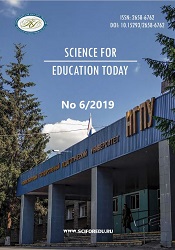Определение объема и содержания фоновых знаний и сформированности социокультурной компетенции у представителей различных поколений на примере концептов «свобода» и «порядок»
Identifying background knowledge and socio-cultural competence in individuals of different age groups (with the main focus on the concepts of “freedom” and “order”)
Author(s): Andrei Olegovich Kozhevnikov, Alexey Alexandrovich ChernobrovSubject(s): Social development, Sociology of Culture
Published by: Новосибирский государственный педагогический университет
Keywords: Cultural competence; Sociolinguistic survey; Concept; Basic cultural concepts; Background knowledge; Lingua-cultural background of the concepts
Summary/Abstract: Introduction. Common background knowledge is a condition of successful communication between different cultures and generations. This article deals with the findings of a sociolinguistic survey conducted within the linguistic research into the concepts of “freedom” and “order”. The purpose of the research is to identify background knowledge and socio-cultural competence in individuals of different generations. Materials and Methods. The authors used a sociolinguistic survey which was carried out in two age groups of native Russian speakers. The first group were secondary school students (Grades 6–10, № 6 Berdsk Lyceum, Novosibirsk region, the Russian Federation) aged between 12 and 15 years. The second (comparison) group consisted of adults aged between 35 and 60 years and older. The employed method was a part of a comprehensive research devoted to the concepts of “freedom” and “order” in native Russian speakers and was focused on identifying cultural competence within particular age groups. The research objectives were to assess secondary school students’ cultural competence and to reveal similarities and differences in understanding concepts of “freedom” and “order” between age groups. Results. The study clarifies the lingua-cultural background of the concepts of “freedom” and “order”. The findings show that the most preferable source of information for the first group of respondents is the Internet. The second group predominantly uses television as a source of information. Another important finding is that high availability of information does not contribute to the development of cultural competence in today’s secondary school students. On the contrary, the level of background knowledge is decreasing within the context of the developed mass culture. Conclusions. Taken together, these results suggest that associative fields of the basic cultural concepts are indistinct in the younger group of respondents.
Journal: Science for Education Today
- Issue Year: 9/2019
- Issue No: 6
- Page Range: 136-148
- Page Count: 13
- Language: Russian

